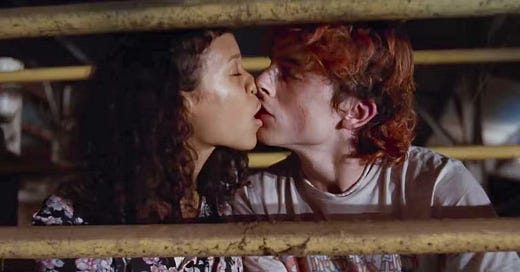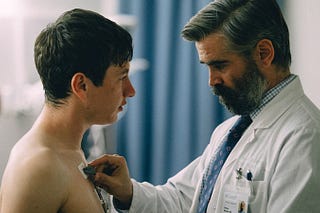
In Review: 'Bones and All,' 'The Menu,' 'She Said'
We head into the thick of good movie season with Luca Guadagnino's romantic cannibal road movie, a foodie satire with a nasty horror streak, and a 'Spotlight' for the #MeToo movement.
Bones and All
Dir. Luca Guadagnino
130 min.
Maren (Russell Taylor) has a hard time making friends but it’s not for a lack of desire. A high schooler in the waning days of the 1980s, Mere is introduced plucking away on a piano as a friend, Sherry (Kendle Coffey), tries to persuade her to sneak out after her father (André Holland) goes to bed and join her and some friends at her house for a slumber party. With some trepidation, Maren agrees, which eventually leads to Maren and Sherry locked in close conversation face-to-face beneath a glass coffee table while Duran Duran plays, a sweet moment that director Bones and All director Luca Guadagnino lovingly frames as a candid image of Reagan-era teen intimacy. But it’s not a moment Maren can live in for long. Before the night is through, she and her father will be on the road, again, looking for a place where nobody knows their name and no one can link them to what Marin’s done.
Maren, for reasons neither she nor her father can explain, is a cannibal and always has been, just like the mother she’s never met. And though her father has supported her and covered up her actions since she claimed her first victim, he can’t do it anymore. Leaving behind some money, her birth certificate, a Walkman and a cassette tape recounting Marin’s life story (which she’ll return to throughout the film), he abandons her, prompting Maren to hit the road in search of her mother, a road trip through the American heartland that will double as a journey of self-discovery.
Hard to pin down, harder to forget, Guadagnino’s latest — an adaptation of a YA novel by Camille DeAngelis scripted by frequent collaborator David Kajganich — more or less splits the difference between Call Me by Your Name and his remake of Suspiria, mixing a dreamy, romantic coming-of-age story set in the recent past with unflinching scenes of bloody carnage. As Maren makes her way toward the small Minnesota town where her mother was born, she encounters others like herself, “eaters” as the folksy, threatening, ponytailed drifter Sully (Mark Rylance) calls them after literally sniffing Maren out and inviting her to dine on a dying woman whose house he’s squatting in. Their partnership proves to be short lived, much to Sully’s frustration, superseded by the more lasting bond Maren develops with Lee (Timothée Chalamet), whom she meets while shoplifting at an Indiana grocery store. Joining her on the road, Lee becomes her companion and, in time, romantic partner, but it’s sometimes an uneasy sort of partnership. Is love possible between two people whose lives have been defined by their outsider status? Is there an ethical way to live as they are in the world or are they truly the monsters their acts would suggest them to be?
Bones and All doesn’t offer any answers and is all the more haunting for it. Its mood is as hazy as cinematographer Arseni Khachaturan’s dreamy (and sometimes nightmarish) images and as restless as Taylor and Chalamet’s yearning, blood-soaked performances. They’re young and driven by a sense of freedom that can be as terrifying as it is liberating and an uncontrollable compulsion that tortures them but also gives them pleasure they seemingly can’t experience any other way. Untethered to a single metaphor, the film’s cannibalism doesn’t map onto drug addiction or sexual identity, but it overlaps with both at various points in the film, along with other forms of outsiderdom.
Episodic in structure, Bones and All is largely built around stops in Maren and Lee’s journey and, often, the tense encounters they experience at each,including an especially memorable scene with an eater played by Michael Stuhlbarg. The chapters come and go, leaving the couple to sort out their meaning as they make their way to their next destination. Ultimately, however, it’s their story — the story of young lovers trying to define their futures while realizing they can never fully leave the past behind — and not the story of those they meet who try to tell them who they are, how they have to live, and how best to sate the hunger that drives them and maybe always will. —Keith Phipps
The Menu
Dir. Mark Mylod
106 min.
The tasting menus at high-end restaurants could be understood as gallery showcases or magic shows or a piece of long-form storytelling—delicately structured, witty, and thematically rich. What that $500/plate, three-hour dining adventure gets you is not something so banal as a round of apps, a big entree, and a dessert to share, but a wallet-siphoning experience in culinary art. Or as Julian Slowik, the executive chef and diabolical master of ceremonies in The Menu, tells the 12 privileged souls selected to dine with him: “Do not eat. Taste.” Their stomachs may growl, but their souls will be sated.
That is, if they make it to the end of the night. Part class satire, part escalating multi-course horror, The Menu cleverly mimics the form of an Agatha Christie chamber piece, only with Hercule Poirot holding the immaculately sharpened butcher knife. In fact, there’s a Death on the Nile quality to the diners stepping on to the boat that will bring them to the restaurant, which draws some of its farm-to-table selections from the ocean and the island it exclusively occupies. As a hint of the pretentiousness to come, the guests are treated to an oyster shell amuse-bouche without the oyster, which gives Tyler (Nicholas Hoult), an eager foodie, the opportunity to pontificate about “mouthfeel.” His date, the more down-to-earth Margot (Anya Taylor-Joy), shuts him down.
That a character played by Anya Taylor-Joy, an exotic alien who walks among us, could be called “down-to-earth” is an indicator of the hoity-toity clientele here, which includes a well-known comic actor (John Leguizamo), a famous food critic (Janet McTeer), and a trio of obnoxious finance guys whose boss happens to be an angel investor in the whole enterprise. Before entering the El Bulli-like space, called Hawthorne, their maître d’ Elsa, played by a delightfully chippy Hong Chau, leads them on a tour of the island, which includes not only the expected sights like a curing room but a military-style barracks where the entire staff sleeps. There’s no evidence they ever leave, in fact. Such is their cult-like devotion to Chef Slowik.
With an upper lip as stiff as a meringue peak, Ralph Fiennes’ chef claps his hands resoundingly before each course and starts telling what will be an increasingly dark story—so dark, in fact, that the early shocks initially seem to the diners like a form of elaborate performance art. (Tyler has a hard time containing his excitement over Slowik’s innovations, even after things get legitimately hairy.) Without spoiling the wheres and hows of The Menu, it’s fair to say that Slowik has meticulously tailored the meal around his guests, though Margot’s presence surprises and unnerves him, because he’d expected someone else. As the others chuckle knowingly about a bread course sans bread and dip into an array of condiments, Margot simply refuses to eat (or taste). The whole evening is an eyeroll for her.
The Menu takes knowing shots at foodie culture—like the similarly themed satire Triangle of Sadness, the ducks in the barrel had it coming—but it doesn’t limit itself to gags about the fussy, tweezer-tweaked plating or the snooty monologues that accompany each morsel that emerges from the kitchen. The screenwriters, Will Tracy and Seth Reiss*, and director, Mark Mylod, one of the main filmmakers on Succession (where Tracy is a writer/producer), have a larger social agenda here, both in the obvious have-and-have-nots dynamic of an elite restaurant and in the less-obvious theme of art and consumerism, which exist in uncomfortable co-dependence. The idea of art literally serving customers is deflating for an artist like Slowik, who may be our villain, but may wonder why he’s turning out masterpieces for rich assholes.
The comic beats of The Menu are a little ragged at times, volleyed among a hit-or-miss ensemble that needed to be more sharply defined to be an effective chorus for the script. But the film fares better as a tightly constructed exercise in horror, like a cross between the mechanized death of a Saw movie and the eat-the-rich grotesquerie of Peter Greenaway’s The Cook, the Thief, His Wife & Her Lover. Margot may be our audience surrogate—a young woman who’d rather have a juicy cheeseburger than a bread-less bread course—but there’s a part of the film that sympathizes with Slowik’s madness, too. He picks his own victims as scrupulously and righteously as cuts of meat from the market. — Scott Tobias
* Tracy and Reiss were once, respectively the EIC and managing editor of The Onion. In fact, the three of us all left the company at about the same time— me to help launch The Dissolve and them to Hollywood writing careers. [Reiss has been on Seth Meyers’ writing staff for years.] I normally recuse myself from writing about friends, but there wasn’t much interaction between The A.V. Club and the comedy side, at least on my end, so I felt sufficiently detached to review this.
The Menu is currently playing in limited release.
She Said
Dir. Maria Schrader
129 min.
She Said, an adaptation of the book of the same name by Jodi Kantor and Megan Twohey that expands on their reporting for The New York Times, is dominated in its early scenes by the story of a powerful, high-profile man confronted with multiple accusations of sexual harrassment and assault. But that’s not the story the movie ends up telling. Or, put another way, She Said ends up telling a variation on the same story, one with a dramatically different ending.
Opening in 2016 (after a brief, haunting prologue set in 1992), the film’s first stretch plays out against the backdrop of the final stages of the 2016 presidential election, when new accusers with stories of awful encounters with Donald Trump seemed to surface every day and Trump himself could be heard bragging about groping women in a behind-the-scenes moment of an Access Hollywood appearance. That he won the presidency anyway—running against a female opponent to boot—and that all those accusations and pieces of evidence didn’t seem to matter, sets the stage for what follows: a battle to investigate accusations of sexual misconduct against producer Harvey Weinstein, the powerful head first of Miramax then of The Weinstein Company.
Directed by Maria Schrader (who previously helmed the Netflix series Unorthodox and memorably played a Stasi agent on Deutschland 83 and its sequels), She Said mirrors its inspiration, unfolding with the methodical deliberateness of a deeply reported story. One discovery leads to the next and the full extent of Weinstein’s offenses — which span decades and continents — start to take shape as Twohey (Carey Mulligan) and Kantor (Zoe Kazan) attempt to draw out one reluctant witness after another. Its approach often recalls Spotlight, Tom McCarthy’s Best Picture-winning film about the Boston Globe’s investigation into sexual abuses within the Catholic Church, both with its unflashy but subtly detailed style and its emphasis on the human cost exacted by the offenses being investigated. Twohey and Kantor’s investigation becomes a tour of lives marred and redirected by the crimes of a man who believes power has insulated him from consequences.
That’s reflected both by Weinstein’s victims and witnesses to his crimes (played by, among others, Jennifer Ehle, Samantha Morton and, as herself, Ashley Judd) and by the deepening commitment of those reporting on them. When first paired with Kantor, Twohey questions whether it’s even worth pursuing a story of harassment set in this world, a reflection of the perception of frivolousness that allowed (and allows) such behavior to flourish in the entertainment industry, but her attitude quickly changes as she begins talking to those involved.
With a minimal amount of back-patting, the film is a stirring illustration of the crucial role played by journalism (albeit one with some slow middle passages that mimic the feeling of when a story feels headed toward a dead end). Kazan and Mulligan play Kantor and Twohey as professionals driven by the anger and compassion that their job requires them to contain. But it’s a job that, when done well with every point locked down and every comma in place, can vindicate those emotions, and maybe make history repeat itself a little less frequently than before. —Keith Phipps






















Cautiously optimistic for The Menu. My standard Wednesday-before-Thanksgiving routine is to go see a movie after work closes early. It works out nicely- no crowds, always plenty of things I'm excited to see with the late fall prestige movie cornucopia. So first I'll see The Menu and then I'll go bake a pie.
"Meren...is a cannibal "
I did not see this coming!